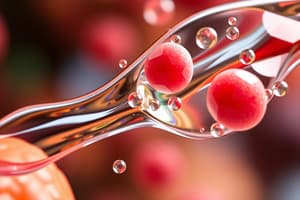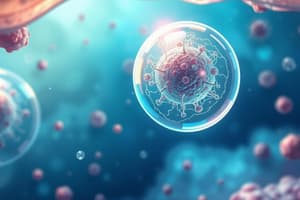Podcast
Questions and Answers
What is the primary mechanism by which the body maintains a stable volume of fluid in each compartment?
What is the primary mechanism by which the body maintains a stable volume of fluid in each compartment?
- Filtration and reabsorption (correct)
- Osmosis and facilitated diffusion
- Active transport
- Diffusion
What is the term describing the ability of an extracellular solution to make water move into or out of a cell by osmosis?
What is the term describing the ability of an extracellular solution to make water move into or out of a cell by osmosis?
- Osmolarity
- Oncotic pressure
- Hydrostatic pressure
- Tonicity (correct)
What is the approximate percentage of body water in a 70kg adult male?
What is the approximate percentage of body water in a 70kg adult male?
- 50%
- 55%
- 65%
- 60% (correct)
What type of transport requires energy and is involved in the movement of molecules against their concentration gradient?
What type of transport requires energy and is involved in the movement of molecules against their concentration gradient?
Which of the following is NOT a type of fluid compartment in the body?
Which of the following is NOT a type of fluid compartment in the body?
What is the primary difference in fluid distribution between infants and adults?
What is the primary difference in fluid distribution between infants and adults?
What occurs in an isotonic solution?
What occurs in an isotonic solution?
Which process requires energy and involves the movement of solutes from an area of low concentration to an area of high concentration?
Which process requires energy and involves the movement of solutes from an area of low concentration to an area of high concentration?
What type of transport proteins are utilized by molecules that are unable to freely cross the phospholipid bilayer?
What type of transport proteins are utilized by molecules that are unable to freely cross the phospholipid bilayer?
What will happen if a cell is placed in a hypertonic solution?
What will happen if a cell is placed in a hypertonic solution?
Which ions require active transport to move across the cell membrane?
Which ions require active transport to move across the cell membrane?
What is the main difference between active transport and facilitated diffusion?
What is the main difference between active transport and facilitated diffusion?
What is the primary factor that determines a solution's tonicity?
What is the primary factor that determines a solution's tonicity?
If a solution has a higher osmolarity than the cell's cytoplasm, what will happen to the cell?
If a solution has a higher osmolarity than the cell's cytoplasm, what will happen to the cell?
What occurs when two solutions of unequal osmolarity are placed together?
What occurs when two solutions of unequal osmolarity are placed together?
What is the term for a solution that has a lower osmolarity than the cell's cytoplasm?
What is the term for a solution that has a lower osmolarity than the cell's cytoplasm?
What is the direction of water flow when the extracellular fluid is hypotonic to the cell?
What is the direction of water flow when the extracellular fluid is hypotonic to the cell?
What is the result of equalizing the concentration of two solutions of unequal osmolarity?
What is the result of equalizing the concentration of two solutions of unequal osmolarity?
Flashcards are hidden until you start studying




